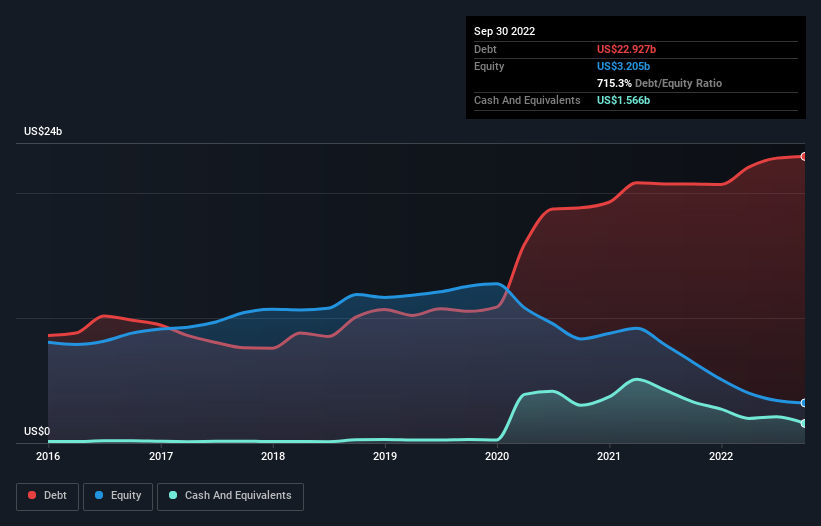- United States
- /
- Hospitality
- /
- NYSE:RCL
Health Check: How Prudently Does Royal Caribbean Cruises (NYSE:RCL) Use Debt?

Warren Buffett famously said, 'Volatility is far from synonymous with risk.' When we think about how risky a company is, we always like to look at its use of debt, since debt overload can lead to ruin. We can see that Royal Caribbean Cruises Ltd. (NYSE:RCL) does use debt in its business. But the more important question is: how much risk is that debt creating?
When Is Debt A Problem?
Debt is a tool to help businesses grow, but if a business is incapable of paying off its lenders, then it exists at their mercy. In the worst case scenario, a company can go bankrupt if it cannot pay its creditors. However, a more common (but still painful) scenario is that it has to raise new equity capital at a low price, thus permanently diluting shareholders. By replacing dilution, though, debt can be an extremely good tool for businesses that need capital to invest in growth at high rates of return. The first thing to do when considering how much debt a business uses is to look at its cash and debt together.
Check out our latest analysis for Royal Caribbean Cruises
What Is Royal Caribbean Cruises's Debt?
The image below, which you can click on for greater detail, shows that at September 2022 Royal Caribbean Cruises had debt of US$22.9b, up from US$20.7b in one year. However, it does have US$1.57b in cash offsetting this, leading to net debt of about US$21.4b.

How Strong Is Royal Caribbean Cruises' Balance Sheet?
According to the last reported balance sheet, Royal Caribbean Cruises had liabilities of US$9.79b due within 12 months, and liabilities of US$20.5b due beyond 12 months. On the other hand, it had cash of US$1.57b and US$534.4m worth of receivables due within a year. So its liabilities outweigh the sum of its cash and (near-term) receivables by US$28.2b.
This deficit casts a shadow over the US$13.6b company, like a colossus towering over mere mortals. So we'd watch its balance sheet closely, without a doubt. At the end of the day, Royal Caribbean Cruises would probably need a major re-capitalization if its creditors were to demand repayment. There's no doubt that we learn most about debt from the balance sheet. But ultimately the future profitability of the business will decide if Royal Caribbean Cruises can strengthen its balance sheet over time. So if you want to see what the professionals think, you might find this free report on analyst profit forecasts to be interesting.
In the last year Royal Caribbean Cruises wasn't profitable at an EBIT level, but managed to grow its revenue by 1,136%, to US$7.2b. When it comes to revenue growth, that's like nailing the game winning 3-pointer!
Caveat Emptor
Even though Royal Caribbean Cruises managed to grow its top line quite deftly, the cold hard truth is that it is losing money on the EBIT line. Its EBIT loss was a whopping US$1.8b. When we look at that alongside the significant liabilities, we're not particularly confident about the company. It would need to improve its operations quickly for us to be interested in it. Not least because it had negative free cash flow of US$3.4b over the last twelve months. So suffice it to say we consider the stock to be risky. There's no doubt that we learn most about debt from the balance sheet. But ultimately, every company can contain risks that exist outside of the balance sheet. We've identified 1 warning sign with Royal Caribbean Cruises , and understanding them should be part of your investment process.
If you're interested in investing in businesses that can grow profits without the burden of debt, then check out this free list of growing businesses that have net cash on the balance sheet.
New: AI Stock Screener & Alerts
Our new AI Stock Screener scans the market every day to uncover opportunities.
• Dividend Powerhouses (3%+ Yield)
• Undervalued Small Caps with Insider Buying
• High growth Tech and AI Companies
Or build your own from over 50 metrics.
Have feedback on this article? Concerned about the content? Get in touch with us directly. Alternatively, email editorial-team (at) simplywallst.com.
This article by Simply Wall St is general in nature. We provide commentary based on historical data and analyst forecasts only using an unbiased methodology and our articles are not intended to be financial advice. It does not constitute a recommendation to buy or sell any stock, and does not take account of your objectives, or your financial situation. We aim to bring you long-term focused analysis driven by fundamental data. Note that our analysis may not factor in the latest price-sensitive company announcements or qualitative material. Simply Wall St has no position in any stocks mentioned.
About NYSE:RCL
Undervalued with solid track record.


